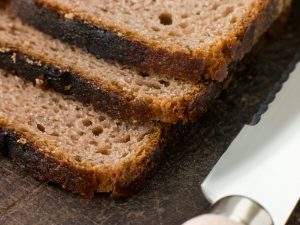
Irritable bowel syndrome, or IBS, is a common gut disorder that can cause abdominal pain and discomfort, and either diarrhea or constipation. People who suffer from IBS can experience a worsening of their symptoms when they eat certain foods. These foods include beans, fried foods, chocolate, cruciferous veggies like broccoli, cauliflower, cabbage and Brussels sprouts, as well as fruits like grapefruit, pears, and peaches.
This latest study showed that irritable bowel syndrome patients who consumed modified rye bread that was low in FODMAPs, experienced milder IBS symptoms than people who ate normal rye bread. FODMAPs are a collection of molecules found in food that some people have trouble absorbing.
The lead author of the research has indicated that although encouraging, low-FODMAP rye bread will likely only reduce some IBS symptoms and is not a solution for overall symptom control.
IBS and FODMAPs connection
Irritable bowel syndrome symptoms vary from person to person, but in addition to abdominal pain, sufferers can experience bloating, gas, heartburn, nausea, constant diarrhea, or incomplete emptying of the bowel. Weight loss and fatigue are also associated with IBS. Diet adjustments are a major way to influence the symptoms in order to lessen the discomfort. Although eliminating offensive foods from the menu has been known to help people with IBS, there has never really been a specific diet for the syndrome. However, now there appears to be some scientific evidence that low-FODMAP diet can help people affected by IBS. More gastrointestinal specialists and dieticians are starting to suggest the low-FODMAP diet for IBS.
What exactly are FODMAPs? When we eat certain foods, it causes our bowel distends due to the fact that the food draws fluid and generates gas when fermented by bowel bacteria. This is caused by dietary components called fermentables. Poorly absorbed short-chain carbohydrates, they have been given the acronym FODMAP. Below you can see what each letter stands for.
- Fermentable – broken down by bacteria
- Oligosaccharides – fructans and galacto-oligosaccharides (GOS)
- Disaccharides – lactose
- Monosaccarides – fructose
And
- Polyols – sorbitol, mannitol, xylitol, and maltitol
When starting a low-FODMAP diet, all FODMAPs should be avoided. However, if a person knows that they can absorb fructose completely, then they don’t need to restrict fructose intake, and if they can completely absorb lactose, they need not restrict lactose intake. If you follow the low-FODMAP diet, you will have to avoid eating wheat and rye in large quantities. Yes, breads, pastas, and cereals will be off limits. There are items such as breadcrumb coating on chicken that you can still eat. A dietician can assess your intolerance levels and guide you. Since rye products contain fructans, many people find they can’t tolerate rye. There are those who can tolerate rye bread in small portions. Once a person has been on the low-FODMAP diet for several weeks and IBS symptoms improve, it is worth trying a small amount of rye bread to check for tolerance.
When it comes to irritable bowel syndrome, moving from that uncomfortable phase to a place where you can feel at ease can be a case of trial and error. If you suffer from IBS, you might try eliminating several items from your diet before you determine exactly what you can and can’t consume. For some people, it can be just a couple food items that activate their symptoms, while others find that wider adjustments have to be made, or low-FODMAP diet could be the answer to their most annoying symptoms.
The good news is, although IBS is a common digestive problem, many people who suffer from it have learned to adjust their diet and thus enjoy a productive and happy life.